#Character: Glinda
Text

“Are you a good witch, or a bad witch?”
#art#cartoon#illustration#drawing#fanart#character design#Oz#the wizard of oz#Glinda#glinda the good witch
908 notes
·
View notes
Text




Wicked Costume designs I made for fun since I had some mini holidays from uni and bc this musical is one of my faves
#wicked#wicked musical#glinda#wicked the musical#wicked elphaba#digital illustration#digital art#my art#painting#artists on tumblr#character design#concept art student#digital painting
365 notes
·
View notes
Text






Austen Danielle Bohmer and Lauren Samuels as Glinda and Elphaba on the second US National Tour (2024-2025)
#gelphie#glinda upland#galinda upland#elphaba thropp#wicked#wicked musical#austen danielle bohmer#lauren samuels#s: for good#gelphie chemistry so good it feels like they've been playing these characters for ages#but they'd been at it for a week by the time of this video lol#obsessed with them. they deserve a long ass post
129 notes
·
View notes
Text
Galinda's True Colours
One key theme in Wicked is superficiality. The world of Oz is a place where honest conversation is difficult to come by. Almost everyone is pretending to be something, or believe something, or have something, all to get what they want.
Popular approaches this theme with the subtlety of a hyperactive wrecking ball and gives a musical monologue about how this world works, and why.
Because Galinda has been portrayed as ditsy up to this point, with a bit of the self-serving schemer archetype thrown in for flavour. But here, we see just how intelligent she is. Galinda has caught on to how the world works, and understands what buttons to push.
Let me explain.
SPOILERS AHEAD (Wicked)
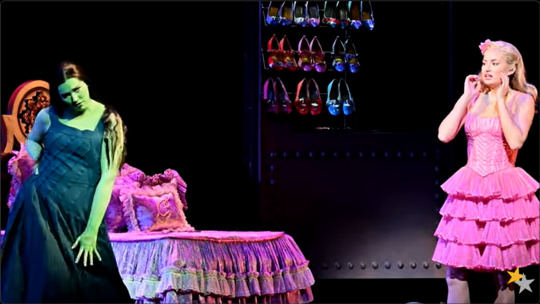
The first element to be brought under examination is Wicked's love for subverting expectations. By this, I mean that certain mindsets in the world have stereotypes associated with them, take idealism and cynicism for example.

From what I have observed, when a writer wants to use one of these archetypes, they will probably draw on a few common ideas. The former is usually portrayed as stary-eyed and naive, or unflinchingly positive. Cynicism meanwhile has a certain sarcasm to it. A cynic might feature a permanent scowl and a dry remark as a kneejerk reaction to anything.
In short, Cynics are usually written to be villains who are overcome by hopeful heroes, or to be heroes who are proven right by a world where hope is meaningless. Idealists on the other hand are either heroes who make the world a better place by sheer force of goodness, or naive fools who the world breaks down.

Obviously, there are exceptions to the rule, but those exceptions are mostly more developed characters in their own right, so the label of "a cynic" doesn't really fit them. Batman is an idealist (when he's written properly).
What is fascinating about Wicked is how the characters are presented. Elphaba is introduced as cynical, she fits the archetype to a tea. But after a musical number, her character swaps entirely. She keeps the sarcasm, but the hopefulness becomes a driving force that goes against the stereotype.
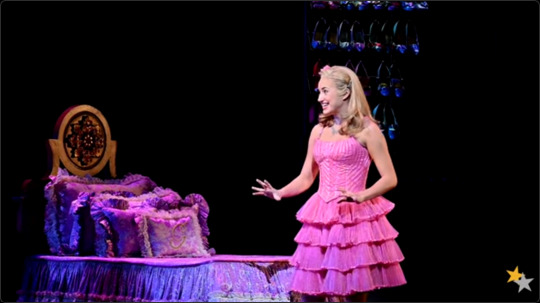
Galinda is... introduced as a bit of a ditz. She's got an ego, she gets what she wants all of the time, she has a well-known family. She's the generic rich kid, essentially. Fiyero gets the same treatment.
For the record, By Galinda, I mean young Glinda, and I am treating them as separate entities until they meet back up.
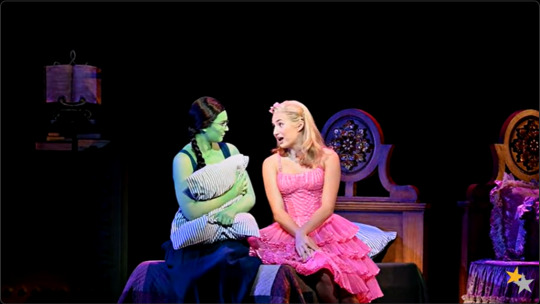
Anyway, when Galinda starts singing, her real worldview becomes clear. It's possible to argue that it wasn't particularly hidden to begin with, but in Popular, she bludgeons you over the head with it.
"Celebrated heads of state
Or 'specially great communicators
Did they have brains or knowledge?
Don't make me laugh!
They were popular!
Please, it's all about popular!
It's not about aptitude
It's the way you're viewed"
As much as I despise it, Galinda is kinda right here.

In 1964, Henry Littlefield published an essay in the American Quarterly titled The Wizard of Oz: Parable on Populism in which he gave some opinions on a theoretical metaphor inherent in The Wonderful Wizard of Oz book (if you don't want to read it, TedEd has a video discussing it and its legacy). He claimed that it was an inherently political book about the time Baum wrote it.
The sparkly new world looks even better if you put on tinted glasses, and only works if you understand that the wizard's power is empty, so Littlefield proposed.
Scholars since have praised, debated, and debunked Littlefield's essay. Pointing out the fact that this is pattern recognition with hindsight, in the same way that you can look to the stars and see a goat.
Essentially, there is an argument for The Wonderful Wizard of Oz being political, and there is an argument (most famously made by its Baum himself) that it is just a children's book.
Wicked is a satire, and not a children's book, so it gets away with some heavy insinuation, but to avoid landmines and a lack of knowledge on my own part, I am going to talk exclusively about how this affects the land of Oz itself, rather than its implications for the real world. Please don't argue in the replies.
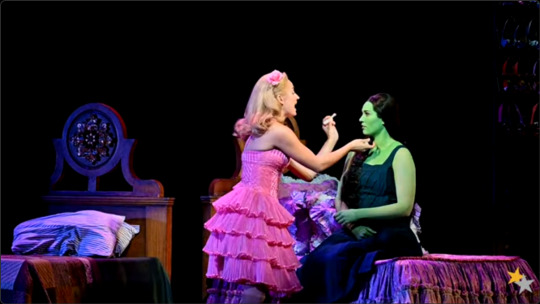
So, Galinda's hypothesis here is that the leaders of Oz do not get to where they are because of any actual skill, but rather because they were well liked by either the people, or their superiors. She gets proven right about this throughout the musical. Madam Morrible moves up in the world by presenting Elphaba to the wizard, the Wizard gained power by giving Oz a common enemy, and Galinda and Fiyero themselves gain status seemingly out of nowhere.
In Oz, it doesn't matter what you know, but who you know, and who knows you.
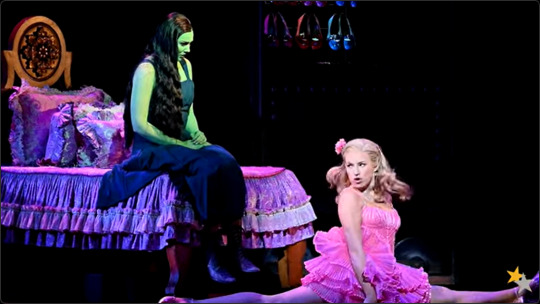
In the show that I watched, Galinda was played by Courtney Monsma, who knocked this number out of the park. Galinda is an incredibly cynical character, but Monsma played her with what I can only describe as "manic pixie energy", which circles back to Wicked's idea of superficiality.
Because the ditzy pantomime of Galinda present in What is this Feeling and half of Dancing Through Life is nothing compared to the madness that is Popular. This is a character who knows exactly how to toss her hair to get what she wants, who knows how to make people think she is something she isn't.
Monsma played a character who was well aware that perception would get her further in life than intelligence, and was having fun with that confidence. But she is actually clever, Galinda has picked up on this fact that everyone else has just accepted subconciously, but now she can explain it.
This song feels like a hyper fixation rant. The frantic obsession was a mere outlet for the excitement of finally being able to speak to this worldview head on to someone who she respects and knows will actually understand her. This song feels like Galinda and Elphaba are on emotional and intellectual equal footing.
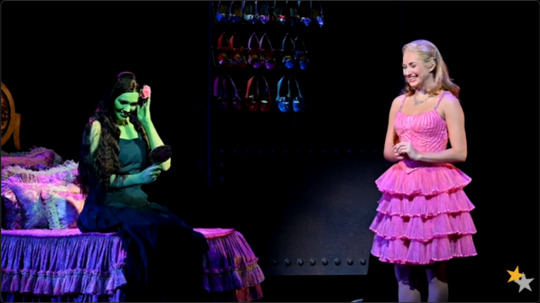
This song is also part of my case for Wicked as a queer musical that only works as a story because the romance doesn't. As in, this is a story about a romance that could have been, and that romance reads as queer to me. I will get more into it next week, but for now, I will say this:
This song doesn't matter, and that's exactly why it does matter.
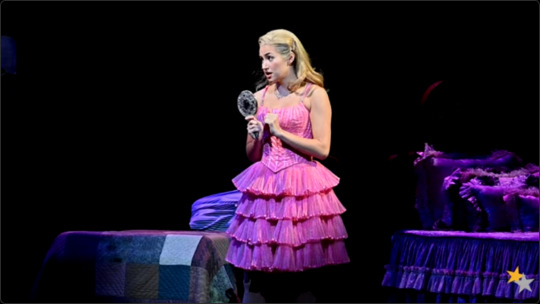
This is the moment when Elphaba and Galinda connect, and share. This is Galinda trying to give back for the wand and make up for her previous behaviour to make Elphaba less of an outcast. But she has already done that.
The moment at the end of Dancing Through Life when Elphaba and Galinda share the spotlight, when Galinda makes herself look like a fool to match Elphaba, when she lets the outcast lead, and the rest of the room goes along with it. That moment is when the romance is kicked off, that is the moment when she starts making amends. That is the moment when she starts to make Elphaba less of a social pariah.
That dance renders Popular superfluous, or at least it does on paper. In reality, this song is doing a lot of heavy lifting in the foreshadowing department, even more so than What is this Feeling, in my most humble of opinions.

Popular happens because Galinda is right about so much in her world, but wrong about the most important thing. Brains and knowledge are irrelevant in Oz, perception is powerful, but empathy rules them all.
Galinda gives this big show of how amazing she is for helping people. Look at her, she's so good. But, Elphaba doesn't care about that, and Galinda does. The romance doesn't work in the end because Galinda realises too late that in the big scheme of things, superficiality is nowhere near as fulfilling as connection. That's why her romance with Fiyero breaks off, and its why her romance with Elphaba is doomed. She only realises this when both options are off the table.
The romance between Elphaba and Galinda breaks apart, but it can only do that because it was there to begin with. You can't tear down nothing.
You could read the relationship as entirely platonic, a friendship that breaks down. But art is subjective, and to me, the romance makes this story so much more compelling.
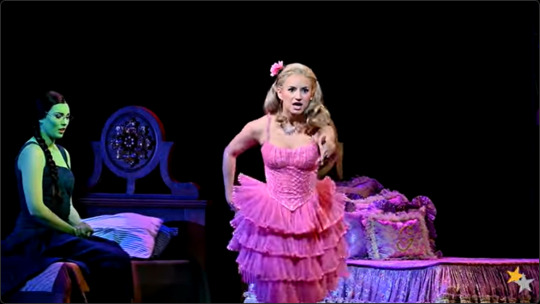
Final Thoughts
Popular is a popular song in the fanbase. It's an absolute bop, but it's also one of the simplest numbers in the entire production. The set is two beds, there is no fancy dancing, just one character sitting still and the other jumping around like she's on springs. The set doesn't change, there are no extra characters, nothing.
This song doesn't let anything distract from the character drama that is going on in centre stage, so that the audience can take in what is actually being said and done.
Next week, I am taking a look at I'm Not That Girl, and I will being going all in on the queer reading of this musical. Although, that is a heterosexual love song, right? How could that be queer? I have thoughts, so stick around if that interests you.
Previous - Next
(Images were sourced from this video)
#rants#literary analysis#literature analysis#character analysis#wicked is a queer story#wicked the musical#glinda upland#elphaba thropp#wicked musical#musical analysis#lgbtq#queer coding#lgbtqia#queer#gelphie#meta#meta analysis
110 notes
·
View notes
Text

I haven't drawn people for a while because I stopped liking my art style but Galinda has been in my head a lot so
#galinda upland#my art#wicked the musical#wicked#wicked galinda#female characters#fictional characters#character art#pink#the good witch#wizard of oz#traditional art#artwork#artists on tumblr#gelphie#elphaba thropp#galinda x elphaba#galinda#wicked glinda#glinda#pink character#glinda wicked#my fanart
51 notes
·
View notes
Text

37 notes
·
View notes
Text
One of my favourite character archetypes is the character going through a redemption arc who has been bad for so long that they've forgotten (or just flat out never learnt) how to be good.
So, instead of being "good" in the typical way, they use their view of how the world works to try and be good in a way that makes sense to them.
It's just really neat to me when media can recognise that good intentions can come in any form, even when a character doesn't go about acting on them in the expected way.
#this is a thought ive had for so long about so many different characters and pieces of media#genuinely one of my favourite character types#the good place#michael tgp#earl hickey#my name is earl#wicked#wicked musical#wicked the musical#glinda#glinda wicked
49 notes
·
View notes
Text

My new Sonic OC, Glinda The Cat! 💖
Glinda is a cheerful cat who knows how to use magic. She also has a passion for art and baking!
She owns her own cafe where she makes coffee and baked goods ☕️🍰
#Glinda The Cat#my oc#sonic the hedgehog#sonic oc#original character#my ocs#my oc art#sonic original character#sonic fan character#sonic#sth#sonic fandom#sonic fanart#sonic art#ocs#oc art#cat oc#digital art#sth art#sth oc#sth ocs#sth fan character
30 notes
·
View notes
Text

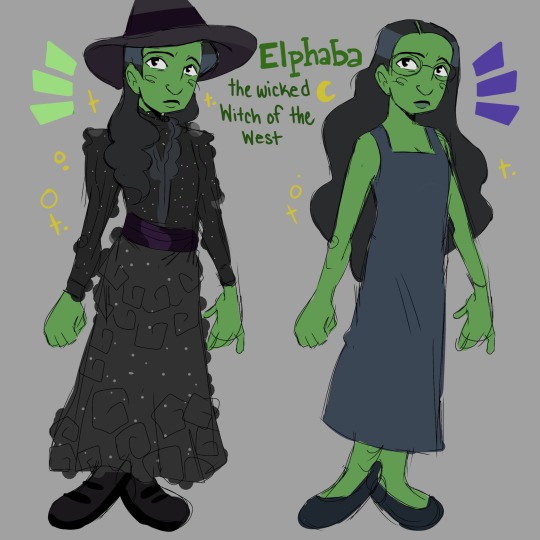
feeling insane over wicked™️ the musical tonight
#my designs aren’t supposed to represent any of the cast members#but glinda is heavily inspired and referenced by brittney johnson 👍🏽#wicked#wicked the musical#glinda upland#elphaba thropp#character design#doodles#draws
399 notes
·
View notes
Photo





My final character design assignment is finally done! I took a famous duo (Elphaba and Glinda) and reimagined them in the style of a game (Okami) and made one an animal (rabbit).
This was really fun and challenging, the Okami style is not what I usually render in so it was cool to play around with.
You can see more in depth process work on Glinda here.
You can see more in depth process on Elphaba here.
If you like what you see and want to support a queer creator you can drop me a Ko-fi here!
#my art#art#wicked#elphaba#glinda#okami#painting#concept art#character design#rabbit#I really went back and forth on which animal I wanted to make Glinda because a mouse or snake would have been really cute too#gelphie
365 notes
·
View notes
Text
that "it's pride month, you know what that means" meme but it's the Wizard and Glinda, but I don't have enough brain cells to do anything with that
#wicked#wicked musical#wicked movie#wicked the life and times of the wicked witch of the west#gelphie#glinda upland#pride month#I hope you know what I'm talking about#the one where he says this and leaves without elaborating and the other character is like???? What do you want me to do
29 notes
·
View notes
Text
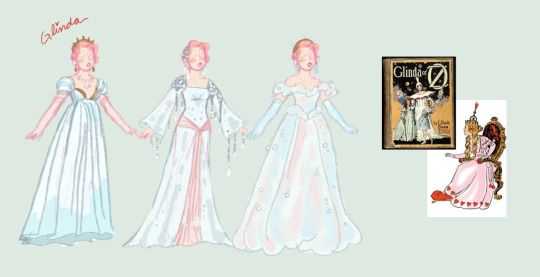

My takes on Dorothy and Glinda! These are from over a year ago, but I thought I would share them since the Ozma post did surprisingly well :)
116 notes
·
View notes
Text
Just some EAH/Wicked Rambling
(Also sorry for taking so long to get this out. Hotd season 2 trailer dropped and Dune Part 2 went to streaming so my attention was divided)
So there’s like a lot of jokes about the similarities between Gelphie and Rapple and I kind just wanna make a post talking about those similarities and differences. Just to kind sort through my thoughts.
So the thing is, I think there are a lot of similarities between Apple and Galinda.
Blonde, pretty, wealthy, privileged, and popular girls rooming with a more sardonic, widely hated roommate. And in spite of how the musical kinda playing up the dumb blonde thing with Glinda cover it, Glinda is also very academic. Her rivalry with Elphaba starts due to Elphaba easily getting into the seminar she was working hard to get into.
And they both have that kind of bubbly, slightly condescending even if not usually on purpose manner to them.
It’s just interesting how they do kind of have a similar starting to due to how much they really differ.
It’s kinda funny to me, after that Apple discourse thing, how different I think people in each fandom feel about Apple and Glinda respectively.
Especially considering Glinda does objectively much worse things. Apple, at the end of the day, is still a teenager in high school. Her bad actions, up until Dragon Games, are mostly on an interpersonal level. Even with Dragon Games, her actions were bad, and dangerous, but also informed by the people in power doing very little once they knew the Evil Queen was out.
Glinda meanwhile, becomes an actual important member of the government during the low point of her story. She may not actively oppress the Animals, but she’s a prominent member and reluctant supporter of the group who does.
Apple genuinely believes in and supports Destiny for most of the show. Glinda strongly disagrees with the the Wizard’s rule but chooses her own comfort and safety for much of the second act.
There is a certain amount of distance to Glinda’s actions (or lack thereof) compared to Apple’s. Raven is a Rebel who is actively harmed by the Destiny system. Elphaba is unquestionably mistreated too, but she’s not an Animal. She is fighting for their plight, but not for herself.
Also. Apple and Raven are very much pit against each other just due to the main story of the show. Meanwhile Glinda and Elphaba, in spite of their fluctuating (and at worst far more actively antagonistic than anything Rapple has) relationship, are very much presented as a unit in the musical.
In EAH, the Royal v Rebel debate is the core of the show with Raven and Apple’s relationship being an important element. While in Wicked, Elphaba and Glinda’s relationship and their love for one another is unquestionably the core of the musical, with the Animal oppression plot being more of an important catalyst for the plot to move.
And I just think that helps inform the character’s actions and reception. Don’t really have a point, just kind of some directionless ramblings I was thinking about recently.
#Glinda is one of my fav characters of all time I’ll always find a way to push her into the conversation#just come thoughts about them#ever after high#apple white#Rapple
21 notes
·
View notes
Text
decided to post my genderbent!Elphaba and Glinda concepts to celebrate the upcoming movie


#ironically the backgrounds took waaaaay longer than the characters#did a whole lotta research to get their names and now i don’t remember why the hell i went with them#bits im not super happy with but i decided to just go with it#wicked the musical#wicked#elphaba thropp#glinda#genderbend
13 notes
·
View notes
Text
Wicked's Existential Crisis
Deception is a big theme in Wicked. I don't think this is news to many people. The wizard is a wizard, truth is truth, happy is what happens when all your dreams come true.
Galinda embodies this pretty heavily, but so does Fiyero, although they do so in similar ways. They both lie to others, and realise that they have been lying to themselves later on.
But, you need a baseline before you get to character development. You need a benchmark for everyone to either move up or down from, depending on the genre.
In my opinion, Dancing Through Life establishes that benchmark, while asking a few more philosophical questions as it does.
Let me explain.
SPOILERS AHEAD
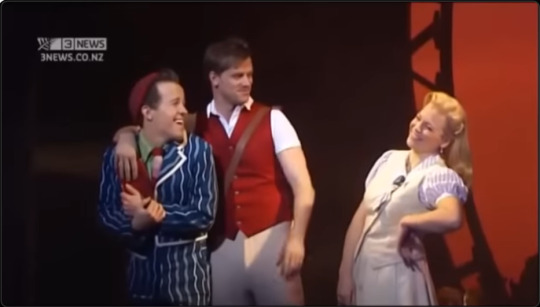
"Dancing through life,
Down at the Oz Dust
If only because dust
Is what we come to.
Nothing matters,
But knowing nothing matters,
It's just life
So keep dancing through"
Fiyero, buddy, friend, pal... are you ok?
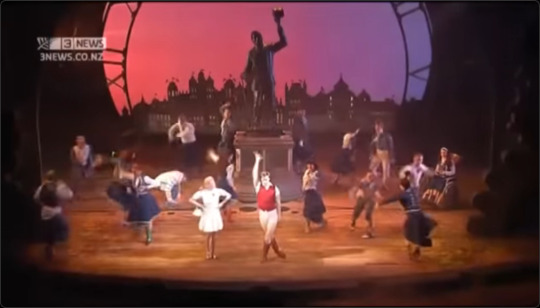
Dancing Through Life is the introduction of Fiyero, and there is a enormous difference between what he is saying and how he is saying it.
That dust line is actually a biblical allusion, with various Judeo-Christian books and prayers claiming that G-d created humans from dust, and that when someone dies, they return to that dust. Hence the "ashes to ashes, dust to dust" saying (source). So, Fiyero is nihilistic.
"Nothing matters, so why bother trying" is such a morbid idea, and its usually associated with emo music, either lots of drums and raw emotions, or quiet and sad. So, when Fiyero sings it as a musical theatre, bombastic full orchestra song, his message flies under the radar because it is so dissonant with the style.
That's the key here. Most of the time, people are nuanced, and stereotypes do not encompass the human experience at all. The emotionally confused or depressed or spiraling person isn't the one who sits in the moonlight writing sappy poetry, it's the person who manages to hide it the most easily because they've been doing it for the longest.
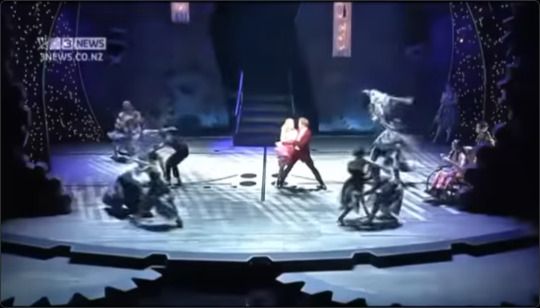
Fiyero is putting up a mask to hide his insecurities, and he is doing it by... not wearing a mask?
Lampshading is the practice of softening elements in a piece of media, letting the audience know that something is out of order or farcical, and turning it into a joke. Overly Sarcastic Productions (@comicaurora) has a video explaining the trope in detail.
In a weird way, this is what Fiyero is doing. He is turning his own crisis into a joke. He doesn't have to hide it if he can poke fun at it. He becomes self-referential, and tells people to move on past the words he is saying and focus on the fun dancing and music.
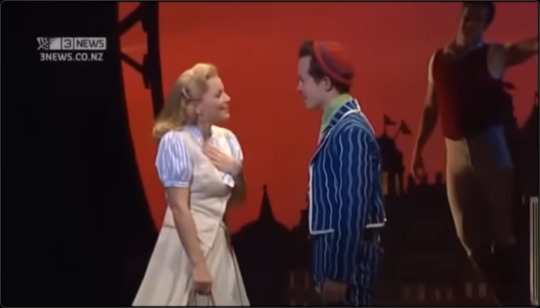
I see where Fiyero is coming from, here. Purpose is difficult to find in this world, and it definitely seems like neither good or bad are rewarded, and luck will do what it will. But I would like to present a counter point.
Everything Everywhere All At Once was easily the most emotionally powerful film of 2022, and it also discussed nihilism in detail. I don't want to get into plot spoilers, but this movie asks the question: If nothing matters, then what?
And the answer to this is clear: Everything. In a Cinema Therapy video on the film, Johnothan Decker states this:
"If nothing we do matters, then the only thing that matters is what we do."
Actions have whatever meaning we ascribe to them, and if we ascribe no meaning to anything, then everything has meaning on the same level. If nothing matters, then everything matters.
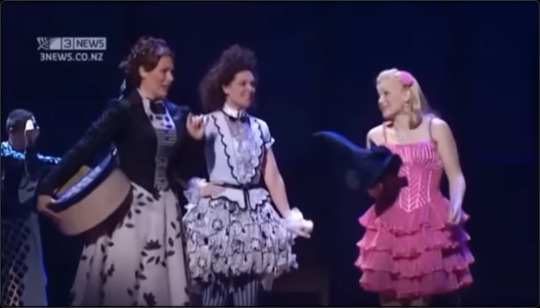
This segways into another core question of the musical and especially this song. Do intentions matter?
Galinda and Elphaba have a comedy of errors with the gift giving, specifically when Galinda sets up Nessa with Boq, and Elphaba arranges for her to receive a wand in return, contrasted with the infamous hat.
Galinda does things for personal gain, and accidentally makes someone's life slightly better for a moment, and Boq kind of does the same. Neither of the two cares about Nessarose, but they bring her happiness in the short term.
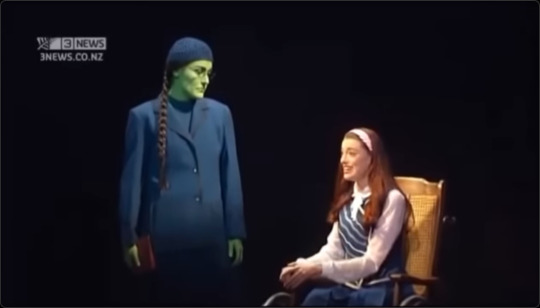
"We deserve each other, and Galinda helped it come true."
I mentioned in my post about The Wizard And I that this theme comes up there first, in association with meeting the wizard, and I think there is something else to it than just deception. Don't get me wrong, this is deception at work, Elphaba with the Wizard and Nessa with everyone around her. But that lie has a positive result here, for the moment.
It also separates the consequences from the intention. Elphaba sees the wizard and wants to improve the world, her hopes are on rocky foundations, but her actions are strong, and I have already mentioned what Galinda's actions do.

However, I would argue that intentions do matter, and that this musical agrees with me, and that is with Boq, a person whom I despise.
As a character, Boq is fascinating. He is a direct satire of the hopeless romantic of stereotypical fairy tales, think Ariel from The Little Mermaid, or Lancelot from the 1963 movie, Lancelot and Guenevere. Boq is trying desperately to court someone who does not care about him and has someone who does care fall from the sky in front of him, but he can't see past himself.
Now, pining is all well and good, you are allowed to pine, and if someone is attracted to you, there is no law that says you must be attracted back. But Boq goes a step further.
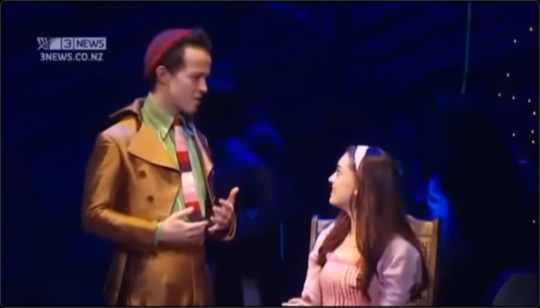
"It's because I'm in this chair
and you felt sorry for me.
Isn't that right?"
"No! No!
It's because you are so beautiful."
Boq had an opportunity to back out of the romance handed to him on a silver platter. He could have said it was just a dance, or even confessed that Galinda put him up to it, if he so desired. But Boq made a choice to keep stringing Nessarose along. He may have his reasons, but I think his actions are not excusable, and the gut punch at the end of the musical when he tells her that he never cared is a betrayal that could have been so easily avoided.
Boq and Fiyero go on to become key players in the "death" of the Wicked Witch of the West, and they do so for alternative reasons, and it reframes Dorothy's journey.
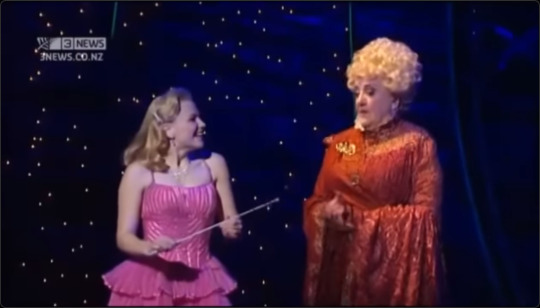
For a more nuanced explanation of what I mean, consider this: In 2019, youtuber Hbomberguy (Harry Brewis) raised $347000 for a Brittish charity organisation called Mermaids in a livestream of Donkey Kong 64, and he gave a speech in October of that year about why he did such a thing.
"I think secretly, we're always making one of two decisions, and we make that decision even if we don't know we're making it. You're either choosing to make life worse for someone you don't like, or better for people you care about.
There is an actual difference, and I didn't realise I made the wrong choice until a lot of people came over and helped change the choice retrospectively."
What you are trying to do matters, because if you keep trying to do good, even if you hit roadblocks, if you are truly committed, you will eventually do some good in the world.

I actually like Brewis' definition of right and wrong here, because it isn't overly philosophical, it pertains to individual actions. You either make someone else's life better or worse.
I have been rambling around my point for a while, so let me make it concise. Dancing Through Life asks philosophical questions about life. What matters? Is it you? Is it your actions? Is it your intentions?
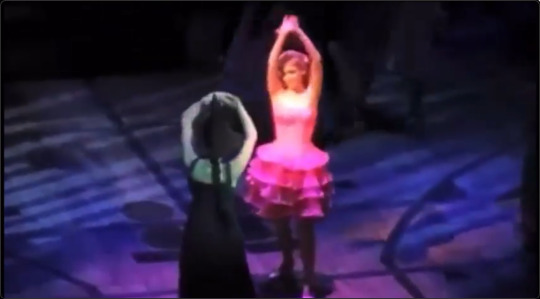
Final Thoughts
There are two other things I need to mention before I finish. First up, the extras are some of the best parts of this musical, and in this song, that is driven home. Everything comes across as so superficial, and not in a "that's bad acting" way, but in a "that's an actor playing a character who is acting" way. This carries over to Galinda's entire style of talking, but the extras knock it out of the park here. It means that the only sincere moments in the song hit with the relevant weight. Those being Elphaba and Nessa's conversation, and the Elphaba dance (something remarkably difficult to find images of).
That dance is the moment I see Glinda x Elphaba (I still refuse to use the Gelphie ship name) actually taking off, rather than in What Is This Feeling, because it's the first moment that the two see eye to eye, and Galinda finally understands Elphaba. She earns her friendship and trust by trying to make up for her mistakes. Galinda talks a lot, but actions speak louder than words, and that dance kicks off a love story.
Next week, I will be diving into Popular, a number that really takes apart the theming to an overt level only matched by one other song, and we will get to that one soon.
Previous - Next
#rants#literary analysis#literature analysis#character analysis#what's so special about...?#wicked#wicked the musical#elphaba thropp#galinda upland#wicked musical#gelphie#wicked is a queer story#fiyero#elphaba#glinda#long post#meta#meta analysis
96 notes
·
View notes
Text
We all know Mrs Gulch is technically the Kansas counterpart of The Wicked Witch of the West. Then what if the equivalent of Glinda in the real world is Mrs Gulch's wife??? And like Dorothy doesen't know they're married, but does know that they live together (that's why she pictures them both as the witches of Oz) and knows Gulch is lowkey a bitch, while her wife is always so nice and caring so she subconsciously assigns the roles that way?? What if Glinda is just a little pretty lesbian motherly wife?? In this essay I will-
#yes i know gay people couldn't marry back then#i just couldn't give less of a shit#i just came up with this idea bc glinda is never shown as a character in kansas which was lowkey confusing for me#so i thought it would be cool bc they're gay#glinda being the nice neighbour who tries to get her short tempered wife to not take away dorothy's dog sounds kinda right#also dorothy being completely unaware that gay people exist but aknowledging that they're the perfect pair#the wizard of oz#glinda the good witch#glinda the good#elphaba thropp#the wicked witch of the west#lesbians#headcannons
19 notes
·
View notes